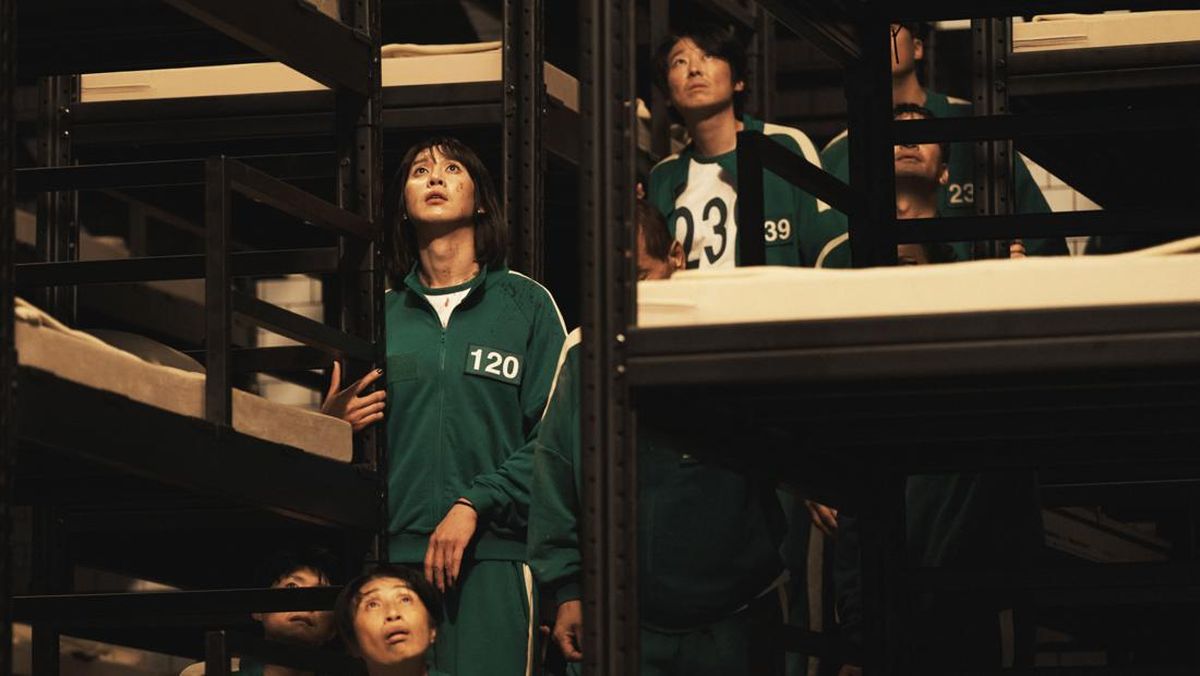Squid game histoire vraie – Squid Game Histoire Vraie: The global phenomenon,
-Squid Game*, captivated audiences worldwide with its brutal games and stark portrayal of societal inequality. But how much of the show’s dark reality reflects actual conditions in South Korea and beyond? This exploration delves into the inspiration behind the hit series, separating fact from fiction, and examining the show’s impact on global conversations about debt, desperation, and the widening gap between the rich and the poor.
We’ll unpack the socio-economic pressures in South Korea that may have fueled the show’s grim narrative, exploring real-life debt crises and societal pressures. We’ll then dissect the show’s creative liberties, separating hyperbole from reality and examining its global resonance. The analysis will compare and contrast the show’s depiction of violence and inequality with the realities in South Korea and other nations, revealing the universality of the themes explored.
The Inspiration Behind “Squid Game”
The global phenomenon that is “Squid Game” didn’t emerge from a vacuum. Its dark, compelling narrative is deeply rooted in the socio-economic realities of South Korea, a nation grappling with significant issues of debt, inequality, and societal pressure.
Socio-Economic Conditions in South Korea

South Korea’s rapid economic growth has been accompanied by a stark widening of the wealth gap. A highly competitive education system and intense pressure to succeed professionally contribute to immense stress and anxiety among its citizens. The pursuit of the “Korean Dream,” often involving high levels of debt for education and housing, can leave many vulnerable to financial hardship.
Examples include the significant rise in personal bankruptcies and the prevalence of “debt-ridden” households struggling to make ends meet.
Debt Crises and Societal Pressures
The show vividly portrays the desperation faced by individuals burdened by insurmountable debt. Many Koreans face the pressure of providing for their families, navigating a competitive job market, and managing the high cost of living, often leading to crippling debt. The prevalence of predatory lending practices and the societal stigma associated with financial failure exacerbate these challenges. Stories of individuals taking drastic measures to alleviate their financial burdens, while not necessarily mirroring the games in “Squid Game,” are unfortunately not unheard of in real life, though at a far lower scale of violence.
Historical Games and Competitions
While the deadly games depicted in “Squid Game” are fictional, the show draws inspiration from traditional Korean children’s games. These familiar games, often played in schoolyards, provide a stark contrast to the life-or-death stakes presented in the series. This juxtaposition enhances the show’s unsettling effect, highlighting the twisted reflection of childhood innocence in a context of extreme desperation.
Portrayal of Class Disparity

“Squid Game” masterfully illustrates the stark class divide in South Korean society. The VIPs, representing the ultra-wealthy elite, are shown indulging in the suffering of the players as a form of twisted entertainment. This disparity mirrors real-world inequalities, where access to resources and opportunities is heavily influenced by socioeconomic status. The show serves as a potent commentary on the systemic issues that perpetuate this imbalance.
Debunking Myths and Misconceptions
While “Squid Game” uses real-world anxieties as a springboard for its narrative, it’s crucial to differentiate between the fictional elements and the reality of life in South Korea. The show employs dramatic license to amplify its themes and create a compelling story.
So you’re curious about “Squid Game histoire vraie”? While the show’s fictional, the desperation it portrays sadly reflects real-world struggles. Think about the scale of that desperation; it’s almost as visually stunning as the incredible light show you’d see at the shanghai new year drone show , a spectacle of technology and artistry. The contrast between the two highlights how far removed from such displays of wealth many people are, making the “Squid Game” premise, unfortunately, more relatable than we’d like.
Fiction vs. Reality in South Korea
It’s essential to emphasize that the deadly games depicted in the series are purely fictional. While South Korea faces challenges related to debt, inequality, and societal pressure, the show’s extreme depiction of violence and the organized nature of the games are exaggerated for dramatic effect. The show is a work of fiction, not a documentary.
Refuting False Claims
There have been several misconceptions surrounding the show’s connection to real-life events. Claims suggesting a direct correlation between the show’s plot and actual events in South Korea are unfounded. The show’s creators have explicitly stated that the games are fictional creations designed to heighten the dramatic tension and explore thematic concerns.
Violence in “Squid Game” vs. Reality
The graphic violence portrayed in “Squid Game” is a significant departure from the reality of crime rates in South Korea. While crime does exist, the level of organized violence depicted in the show is a fictional exaggeration used to underscore the desperation and brutality of the situation. The show’s depiction of violence serves a narrative purpose, not a reflection of actual crime statistics.
Exaggeration and Dramatic License
The show’s success lies in its ability to take existing social anxieties and amplify them for dramatic effect. The extreme situations and exaggerated violence are tools used to heighten the emotional impact and underscore the show’s central themes. The show is a commentary on societal issues, not a literal representation of them.
The Show’s Reflection of Global Issues
The themes explored in “Squid Game”—debt, desperation, and inequality—are not unique to South Korea. These are global challenges faced by millions across the world, highlighting the universality of the show’s message.
Universality of Debt, Desperation, and Inequality
The struggle for economic survival and the crushing weight of debt are experienced in many countries around the globe. The show’s popularity reflects a shared human experience of economic hardship and the desperation it can breed. The show’s resonance lies in its ability to tap into these universal anxieties.
Similar Socio-Economic Struggles Worldwide
Examples of similar struggles include the global debt crisis, the rise of income inequality in many developed and developing nations, and the pervasive impact of poverty and lack of opportunity on vulnerable populations. These issues transcend national borders and are reflected in the show’s narrative.
Comparison with Other Countries
While the specific context might differ, the core themes of “Squid Game” resonate across various countries. The struggle for survival against overwhelming odds, fueled by economic hardship and social inequality, is a common narrative across diverse cultures.
Comparison of Socio-Economic Issues
| Country | Issue | Severity | Solutions Attempted |
|---|---|---|---|
| South Korea | High youth unemployment and debt | High | Government job creation programs, debt relief initiatives |
| United States | Income inequality and student loan debt | High | Progressive taxation, student loan forgiveness programs |
| India | Poverty and lack of access to healthcare | Very High | Poverty alleviation programs, government healthcare initiatives |
| Brazil | High crime rates and income inequality | High | Social programs, law enforcement initiatives |
The Impact of “Squid Game” on Global Awareness: Squid Game Histoire Vraie

The unprecedented global success of “Squid Game” has significantly impacted public discourse on social and economic inequality. Its widespread popularity has spurred conversations and prompted renewed attention to these critical issues.
Global Popularity and Public Discourse
The show’s popularity sparked widespread discussions on social media and in mainstream media outlets. The show’s themes resonated with audiences globally, prompting reflection on the societal issues it highlighted.
So, you’re curious about the “Squid Game histoire vraie”? While the show’s fictional, the desperation it depicts is sadly real for many. Think about the scale of that desperation – it’s almost like imagining the sheer number of drones needed for a spectacle like the china drone show 2031 , except instead of light shows, it’s a fight for survival.
The show’s impact highlights the need to address real-world inequalities, which is far more important than any fictional game.
Discussions on Social and Economic Inequality
The show fueled important conversations about the widening gap between the rich and the poor, the crushing weight of debt, and the desperation faced by many in the pursuit of economic stability. These discussions have helped raise awareness and promote dialogue around these critical issues.
Real-World Initiatives Inspired by “Squid Game”
While there haven’t been direct, large-scale initiatives directly attributed to “Squid Game,” the show’s impact on public awareness has undoubtedly contributed to a renewed focus on addressing social and economic inequality in various ways. For example, increased public attention to existing debt relief programs and discussions on wealth redistribution policies can be partially attributed to the show’s impact.
Increased Awareness of Global Socio-Economic Issues

- Highlighted the universality of debt and economic hardship.
- Sparked conversations about income inequality and class disparity.
- Increased public awareness of the societal pressures faced by many.
- Prompted discussions on the need for social safety nets and economic reform.
Visual Representations of “Squid Game’s” Themes
The visual language of “Squid Game” effectively conveys its core themes. Through careful use of color palettes, composition, and symbolic elements, the show creates a powerful visual narrative.
Wealth vs. Poverty, Squid game histoire vraie
The contrast between wealth and poverty is visually depicted through a stark juxtaposition of colors and settings. The opulent, brightly lit world of the VIPs is contrasted with the drab, muted tones of the players’ impoverished surroundings. The composition emphasizes the physical and emotional distance between the two groups, highlighting the vast disparity in their lives. Symbolic elements, such as the luxurious settings of the VIPs versus the cramped, squalid living conditions of the players, further reinforce this contrast.
Desperation and Hopelessness
Desperation and hopelessness are conveyed through a muted color palette, dominated by grays, browns, and desaturated colors. The characters’ body language, often slumped and defeated, reinforces this feeling. The use of close-ups on the characters’ faces emphasizes their emotional distress. The claustrophobic and oppressive settings further enhance the sense of despair and confinement.
Psychological Impact of Debt and Pressure
The psychological impact of extreme debt and pressure is visually represented through distorted perspectives and unsettling imagery. The use of shadows and darkness creates a sense of unease and paranoia. Visual metaphors, such as the maze-like game settings, symbolize the characters’ feeling of being trapped and overwhelmed. The characters’ increasingly gaunt and stressed appearances visually represent the psychological toll of the games.
Ending Remarks
Ultimately,
-Squid Game Histoire Vraie* reveals a complex interplay between fiction and reality. While the show’s deadly games are purely fictional, the underlying themes of debt, desperation, and inequality resonate deeply with audiences globally. The show’s popularity has sparked crucial conversations about socio-economic disparities, prompting a much-needed global dialogue on systemic issues and potential solutions. By understanding the inspiration and impact of
-Squid Game*, we can better address the very real struggles faced by millions worldwide.
So, you’re wondering about “Squid Game histoire vraie”? While the show’s fictional, the desperation it portrays is real. Think about the lengths people go to for survival; imagine deploying a high-tech solution like the magura v5 sea drone to find resources in a harsh environment – a parallel to the games’ high stakes. The show highlights the brutal realities of inequality, a problem that sadly isn’t just a game.
General Inquiries
Was
-Squid Game* based on a true story?
No,
-Squid Game* is a fictional show. However, its themes are inspired by real-world socio-economic issues in South Korea and globally.
Are the games in
-Squid Game* based on real Korean games?
Some of the games are reminiscent of children’s games played in South Korea, but the deadly consequences are entirely fictional.
How accurate is
-Squid Game*’s portrayal of South Korean society?
While the show exaggerates certain aspects for dramatic effect, it highlights real issues like high debt levels and social stratification within South Korean society.
What impact has
-Squid Game* had on South Korea?
The show has boosted tourism in some areas, but it’s also sparked discussions about real social issues and prompted some policy considerations.
